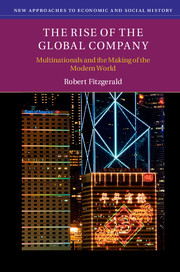Book contents
- Frontmatter
- Contents
- List of tables
- Preface and acknowledgements
- 1 Multinationals, states and the international economy
- 2 Empires of business: 1870–1914
- 3 The reverse gear?: 1914–1948
- 4 Cold War and the new international economic order: 1948–1980
- 5 Global economics?: 1980–2012
- Conclusion: International business in time
- Notes
- Bibliography
- Index
2 - Empires of business: 1870–1914
Published online by Cambridge University Press: 05 December 2015
- Frontmatter
- Contents
- List of tables
- Preface and acknowledgements
- 1 Multinationals, states and the international economy
- 2 Empires of business: 1870–1914
- 3 The reverse gear?: 1914–1948
- 4 Cold War and the new international economic order: 1948–1980
- 5 Global economics?: 1980–2012
- Conclusion: International business in time
- Notes
- Bibliography
- Index
Summary
Multinationals and empire
How legitimate is it to portray the decades before 1914 as part of the age of globalization? We can quickly discover in the nineteenth century signposts to the ‘modern’ world, including industrialization, urbanization, electrification, motorized transport, and long-distance communication; there existed the rise of democratic (and, more latterly, anti-democratic) popular movements, a strong sense of nation, and armies equipped with deadly technologies; firms that could utilize science and undertake large-scale production; within cities, amongst much poverty, we can trace the origins of mass consumption; and a world that was dependent on flows of international trade and investment and on multinational businesses able to operate across continents.
After the First World War, the economist John Maynard Keynes attacked those victorious nations whose governments, he believed, had imposed peace terms without proper regard for global interdependence. He acknowledged what, before the catastrophe of 1914, had been a remarkable surge in transnational business, meaning that someone living in London could order by telephone the products of the whole earth, and invest in the natural resources to be found all over the world. He viewed the internationalization of social and economic life as ‘nearly complete in practice’, but acknowledged, too, how ‘the projects and politics of militarism and imperialism, of racial and cultural rivalries, of monopolies, restrictions, and exclusion…were to play serpent to this paradise’ (Keynes, 1919). Admittedly, the metropolitan figure Keynes described was more typical of his social class than the majority of London's inhabitants, but, during the nineteenth century, international trade and investment grew to have a far-reaching impact on populations throughout the globe.
As well as tracing the origins of the multinational enterprise, we are interested in its dynamism. In what ways was the international economy before 1914 distinct from later periods, and can we talk of a first global economy or International Economy I? As we shall see, multinational enterprises had become an established feature of this international economic system. Inevitably, their effect was not purely commercial, but intimately tied to developments in politics, society and diplomatic affairs. The late nineteenth century is most easily characterized as the era of empire. The scale of imperialism shaped the flow of global trade and investment, as would its later decline.
- Type
- Chapter
- Information
- The Rise of the Global CompanyMultinationals and the Making of the Modern World, pp. 24 - 155Publisher: Cambridge University PressPrint publication year: 2016



